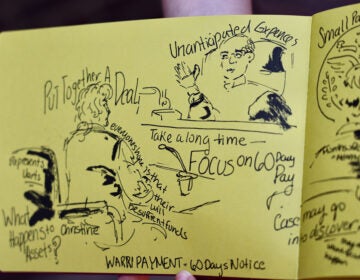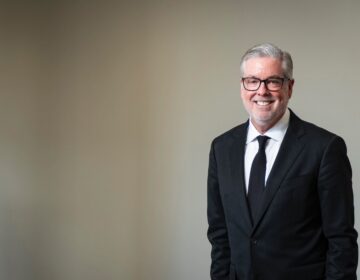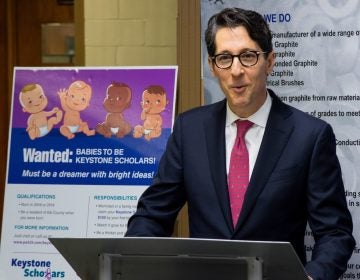Should we forgive student debt for young farmers?
Listen 5:40
Frank Kurylo, 27,co-owns an organic farm with a partner but he is still paying off his student loan debt. (Kimberly Paynter/WHYY)
Farmers in the U.S. are getting older, and some say we should forgive the student loan debt of aspiring farmers to prevent a shortage in the profession.
27-year-old Frank Kurylo got up at 6 a.m. to harvest broccoli, lettuce, and other produce on the ten-acre organic farm that he owns with a partner, about an hour outside Philadelphia.
Around 200 families have paid for shares of his harvest, and they pick up produce regularly. Kurylo also sells his produce at a farmers market, some local restaurants, and a Whole Foods supermarket in the area.
And today, his carrots and strawberries have impressed some potential new customers — a group of chefs are opening a new restaurant in the fall, and they’re visiting the farm because they want to buy local produce.
Buying local produce continues to be a big trend in restaurants. But Kurylo says farming, the job, isn’t that popular.
“It’s funny, we joke around all the time about PSAs about telling your family you’re going to be a farmer because it’s just such a weird thing,” he says. “‘You went to college to not do manual labor’; there’s this like stigma with doing manual labor.”
He studied political science in college, thinking he would go into environmental law, but he loves farming. However, he still has student loans to pay off, and that’s a problem because farming doesn’t pay that much.
More than 80 percent of the food that we eat in the U.S. is produced here, according to the U.S. Department of Agriculture, so we need farmers. But they’re getting older. The average age is 58 and climbing, so there’s a bit of a shortage of people going into farming, and some say student loan debt is a major obstacle.

Andrew Bahrenburg, the national policy director of the National Young Farmers Coalition, says “we are staring down the barrel of a crisis in the farm population.”
A few years ago, they surveyed 700 people in the coalition and 30 percent said they are not farming or can’t start their own farm because it wouldn’t be enough to pay off their student loan debt.
Jim Ladlee, a program director at Penn State Extension, works with a lot of farmers and studies what they do. He says with climate change and more extreme weather events, it’s more important now than ever for farmers to go to school and learn how to grow more diverse crops, and choose the right varieties that can survive droughts or floods.
“Doing the same thing or growing the same crop for 30 years is not likely to be successful in the future,” he says. “We’re going to need scientists and science based farms in the future for sure.”
For example, he says that if you’re a dairy farmer now, you can get more than 130 data points every day for every cow, how active the cow is, how much food it’s eating, and so on.
Or, crop farmers can now use drones to get a birds’ eye view of their fields to see if they can target specific areas that need pesticides, as opposed to the old method of just spraying the entire field.
“There’s just a lot more to it than there ever has been, a lot of science involved today and a lot of management of data.”

One potential solution is to address student loans directly and just forgive the loans of young farmers after ten years of paying back the debt. That’s already the case for full-time public service workers, like nurses and police officers.
There’s a bipartisan bill in the house to add farmers to the list, called the Young Farmer Success Act.
New York State already has a program to forgive up to $50,000 of student loan debt for graduates who farm full time for at least five years.
But the House bill would have to count farming as a public service, which some have criticized.
Davon Goodwin became a farmer in North Carolina after he joined the Army, served in Iraq and Afghanistan and got hit by a bomb.
“I didn’t sign up to serve my country for the paycheck, you sign up because you know you love what you do, you love to serve and you put this country before yourself, and that’s how I look at farming,” he says. “Being a farmer to me is no less than being a soldier, a nurse…they all have the same high importance in society because you’re giving yourself to serve your community when you could be doing something totally different.”
He says now that his military missions are over, his new mission is to make sure everyone around him can afford the kind of organic local produce that you can charge a premium for.
“When I go into a Whole Foods, it makes me angry,” he says. “I know that organic costs more because more labor goes into it … but … why can’t anybody have access to that kind of food?”
There is one big obstacle for the Young Farmer Success Act: even if farming gets added to the list of jobs covered by the public service loan forgiveness program, the Trump administration’s education budget would cut that program.
Congressman Glenn Thompson, a Republican from Pennsylvania who co-sponsored the Young Farmer Success Act, says he is preparing for that debate.
He says he supports public service loan forgiveness and that it’s “hard to believe that anyone would question that we need to encourage people to go into farming so that we can continue to have food security and feed ourselves.”
Emily Best, general manager at Tuscarora Organic Growers Cooperative in central Pennsylvania, says consumers should really think about the rural communities that depend on agriculture. She is also paying back a five-figure student loan debt.
She says her farm sells its produce to Washington, D.C. as well as in Pennsylvania, and that her farm hires 25 people, up to 30, in the peak season.
“We’ve seen that rural areas are frustrated with lack of jobs, lack of opportunities,” Best says. “Farming is one of those main opportunities in these areas where I work.”
“It’s so important for cities like Philadelphia, and D.C., Pittsburgh to look bigger picture and look at the area where they’re buying from and say, ‘I want to support that farmer who lives in Central Pennsylvania over a larger vegetable growing farm in Mexico or California, because this is my community and it’s my backyard, and it’s good for us all if the whole community, the region, is strong, both in the cities and the rural areas.'”
WHYY is your source for fact-based, in-depth journalism and information. As a nonprofit organization, we rely on financial support from readers like you. Please give today.







